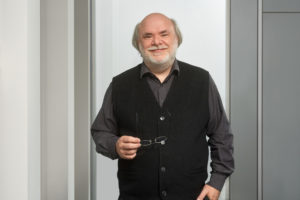NHR PerfLab Seminar: Digital Reality: From Learned Models via Synthetic Data to Trusted-AI — and Back! (January 31, online)
Speaker: Prof. Dr.-Ing. Philipp Slusallek, Saarland University and German Research Center for Artificial Intelligence (DFKI)
Title: Digital Reality: From Learned Models via Synthetic Data to Trusted-AI — and Back!
Date and time: Tuesday, January 31, 2:00 p.m. – 3:00 p.m. CET
Slides: NHR-ER-Jan-2023.pdf
Abstract:
In order for AI systems to make the right decisions, they need to accurately “understand” the complex reality of the world around them. Directly learning models from observed data is often really hard or even impossible. Instead we need to take a modular approach of independently learning partial models of many different aspects of the world and putting them together as needed. Simulations — not only of the partial Models but also including the sensors of the AI system — then allows for generating exactly the synthetic data required for specific use cases. This can involve training of AI systems but also benchmarking, validation and — most important for industry — certification of “Trusted-AI” systems that provide guarantees about their functionality. But these “Trusted-AI“ systems also need to understand what they do not understand about their environment with the goal of improving their digital models about reality. In this talk, I will describe “Digital Reality”, a comprehensive approach developed at DFKI that combines modeling, simulation, AI and high-performance computing in an unique and integrated way.
Short bio:

Philipp Slusallek is scientific director and member of the executive board at the German Research Center for Artificial Intelligence (DFKI), where he heads the research area on Agents and Simulated Reality. Prof. Slusallek co-founded and is director of strategy at the European AI initiative CLAIRE (Confederation of Laboratories for Artificial Intelligence Research in Europe, claire-ai.org) since 2018. At Saarland University he has been a professor for computer graphics since 1999, a principle investigator at the German Excellence-Cluster on “Multimodal Computing and Interaction” from 2007 to 2019, and co-founder and director for research at the Intel Visual Computing Institute 2009-2017. Before coming to Saarland University, he was a visiting assistant professor at Stanford University. He is a member of acatech (German National Academy of Science and Engineering), a fellow of Eurographics, and was a member of the High-Level Expert Group on Artificial Intelligence for the European Commission and an associate editor for Computer Graphics Forum. He originally studied physics in Frankfurt and Tübingen (Diploma/MSc) and got his PhD in computer science from the Friedrich-Alexander-Universität Erlangen-Nürnberg (FAU). His research covers a wide range of topics including artificial intelligence in a broad sense, simulated/digital reality, real-time and realistic graphics, high-performance computing and simulation, motion synthesis, novel programming models for CPU/GPU/FPGA, computational science, and others.
For a list of past and upcoming NHR PerfLab seminar events, see: https://hpc.fau.de/research/nhr-perflab-seminar-series/

